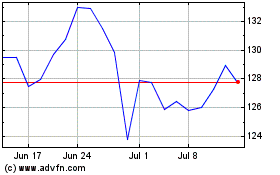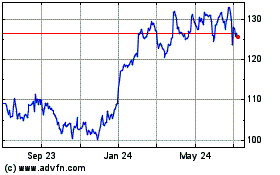New Research Initiative Seeks to Identify
Unmet Needs and Address Key Gaps in the Management of Type 2
Diabetes
Merck (NYSE:MRK), known as MSD outside the United States and
Canada, today announced the launch of a global registry to evaluate
the experiences and outcomes of approximately 20,000 patients with
type 2 diabetes in real-world settings over three years. The
registry is part of Merck’s new global research initiative
evaluating outcomes of patients with type 2 diabetes in everyday
clinical practice. The research initiative and the new registry
reflect Merck’s broader commitment to generate real-world evidence
to help advance diabetes care.
The type 2 diabetes registry will be conducted at more than 900
sites across the United States, Germany, France and Japan. Led by
external experts in each country, the registry will evaluate blood
glucose control, healthcare resource utilization, medication
adherence, quality of life and patient satisfaction.
“Type 2 diabetes is a progressive disease that affects an
estimated 382 million people worldwide1,” said Lawrence Blonde,
M.D., chair of the Merck type 2 diabetes registry, and director of
the Ochsner Diabetes Clinical Research Unit in the Department of
Endocrinology, Diabetes and Metabolic Diseases at the Ochsner
Medical Center in New Orleans. “By evaluating a full range of data,
the Merck registry will provide valuable insights into
opportunities to improve the care of people with type 2 diabetes on
both regional and global levels.”
“Real-world research is a meaningful assessment of the
day-to-day management of patients with diabetes—and is an important
complement to clinical trials as we seek to identify unmet needs
and new solutions to help improve patient outcomes, access and
adherence,” Peter Stein, M.D., vice president, diabetes and
endocrinology, Merck Research Laboratories. “We are thrilled to
partner with our academic collaborators on this initiative, and to
build on Merck’s leadership in diabetes and our commitment to
scientific innovation.”
About Merck’s type 2 diabetes registry
This multinational prospective registry is designed to generate
comprehensive, real-world data on patients diagnosed with type 2
diabetes. The registry will utilize various data sources, such as
surveys, and administrative claims data in the United States.
Through these various data sources, the registry will help to
identify gaps in type 2 diabetes management and provide other
important information.
Merck’s commitment to diabetes
Through these and many more initiatives, on our own and with
others, Merck is strengthening its leadership in diabetes to
deliver a broad portfolio of solutions to help improve the
management of diabetes.
About type 2 diabetes
Twenty-nine million people in the United States2 and 382 million
globally have diabetes,1 and 90% to 95% of these people have type 2
diabetes.2 The number of patients with diabetes globally is
expected to exceed 500 million by 2035.1 One in three American men
and 2 in 5 American women born in 2000 will develop diabetes
sometime during their lifetime.3 Approximately 50 percent of
patients globally remain undiagnosed.1 The current global
healthcare expenditures are approximately $548 billion.1
When someone has type 2 diabetes, the body does not make enough
insulin and/or the insulin that the body makes does not work
properly. This causes blood sugar levels to become too high, and
the body may also keep making sugar even though it does not need
it.4,5 Once a person has type 2 diabetes, it does not go away, and
having diabetes can lead to serious health problems, such as heart
disease and stroke.4,5
About Merck
Today’s Merck is a global healthcare leader working to help the
world be well. Merck is known as MSD outside the United States and
Canada. Through our prescription medicines, vaccines, biologic
therapies, and consumer care and animal health products, we work
with customers and operate in more than 140 countries to deliver
innovative health solutions. We also demonstrate our commitment to
increasing access to healthcare through far-reaching policies,
programs and partnerships. For more information, visit
www.merck.com and connect with us on Twitter, Facebook and
YouTube.
Merck Forward-Looking Statement
This news release includes “forward-looking statements” within
the meaning of the safe harbor provisions of the United States
Private Securities Litigation Reform Act of 1995. These statements
are based upon the current beliefs and expectations of Merck’s
management and are subject to significant risks and uncertainties.
If underlying assumptions prove inaccurate or risks or
uncertainties materialize, actual results may differ materially
from those set forth in the forward-looking statements.
Risks and uncertainties include but are not limited to, general
industry conditions and competition; general economic factors,
including interest rate and currency exchange rate fluctuations;
the impact of pharmaceutical industry regulation and health care
legislation in the United States and internationally; global trends
toward health care cost containment; technological advances, new
products and patents attained by competitors; challenges inherent
in new product development, including obtaining regulatory
approval; Merck’s ability to accurately predict future market
conditions; manufacturing difficulties or delays; financial
instability of international economies and sovereign risk;
dependence on the effectiveness of Merck patents and other
protections for innovative products; and the exposure to
litigation, including patent litigation, and/or regulatory
actions.
Merck undertakes no obligation to publicly update any
forward-looking statement, whether as a result of new information,
future events or otherwise. Additional factors that could cause
results to differ materially from those described in the
forward-looking statements can be found in Merck’s 2013 Annual
Report on Form 10-K and the company’s other filings with the
Securities and Exchange Commission (SEC) available at the SEC’s
Internet site (www.sec.gov).
___________________________1 International Diabetes Federation.
Diabetes Atlas, 6th Edition. Found at:
http://www.idf.org/sites/default/files/EN_6E_Atlas_Full_0.pdf.
Accessed 18 April 2014.2 Centers for Disease Control and
Prevention. National Diabetes Statistics Report: Estimates of
Diabetes and Its Burden in the United States, 2014. Atlanta, GA: US
Department of Health and Human Services; 2014.3 Narayan KMV, Boyle
JP, Thompson TJ, Sorensen SW, Williamson DF. Lifetime risk for
diabetes mellitus in the United States. JAMA 2003 October
8;290(14):1884-1890.4 American Diabetes Association. Standards of
Medical Care in Diabetes—2014. Diabetes Care. 2014; 37(suppl
1):S14–S80.5 Ali MK, Bullard KM, Saaddine JB, Cowie CC, Imperatore
G, Gregg EW. Achievement of Goals in U.S. Diabetes Care, 1999–2010.
New England Journal of Medicine. 2013;368:1613–1624.
Media:Pam Eisele267-305-3558orKim Hamilton908-423-6831 /
908-391-0131orInvestors:Justin Holko908-423-5088
Merck (NYSE:MRK)
Historical Stock Chart
From Mar 2024 to Apr 2024

Merck (NYSE:MRK)
Historical Stock Chart
From Apr 2023 to Apr 2024
